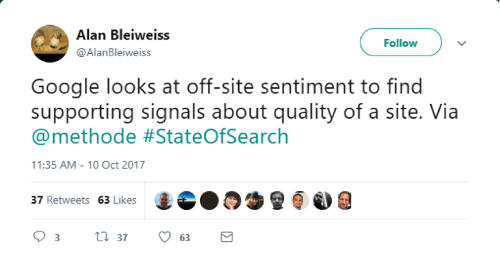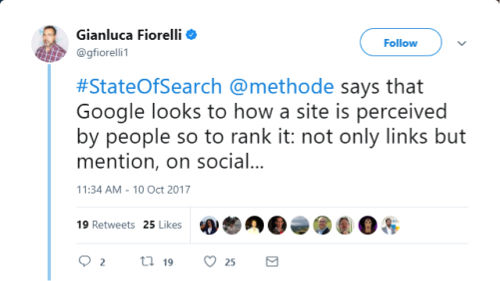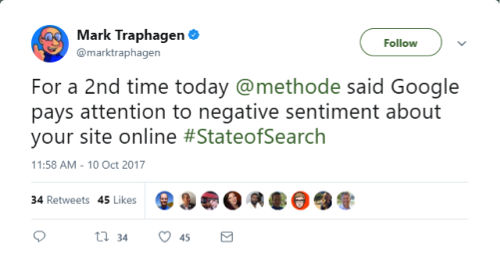There are changes on the horizon. As we step into the world of voice search, where users don't always have convenient links to click on, I wouldn't be surprised to see linkless mentions become more important to SEO than ever before.
Links are, no doubt, still vital to organic rankings. Study after study finds that there is a strong correlation between link signals and SERP results, as does the industry survey we at Link-Assistant conducted. And Google has firmly stated that PageRank is still a key ranking signal.
Most important, links matter because of what they represent: user trust. As search engines get better at understanding user sentiment (i.e., interpreting what content users value, which sources they trust, and whose opinions they listen to), there's a very real possibility that linkless mentions could one day be weighed as heavily as actual links.
In fact, we already know that sentiment analysis plays a big role in some search engine ranking algorithms.
Bing/Yahoo
Bing has always been a little more forthright than Google about how its ranking algorithm works, which is why we know that sentiment analysis and social signals are part of its strategy. Understanding sentiment is key to understanding what to trust, according to Bing.
The evidence for that comes mainly from Bing's Webmaster Guidelines, which state: " Social media plays a role in today's effort to rank well in search results. The most obvious part it plays is via influence. If you are influential socially, this leads to your followers sharing your information widely, which in turn results in Bing seeing these positive signals. These positive signals can have an impact on how you rank organically in the long run."
Furthermore, at an SMX West event, a former Bing sr. product manager stated: "Years ago, Bing figured out context and sentiment of tone, and how to associate mentions without a link. As the volume grows and trustworthiness of this mention is known, you'll get a bump in rankings as a trial."
Google is notoriously tight-lipped about the exact role of social signals in its algorithms. Its official stance is that social signals do not have a significant impact on ranking, but some recent studies suggest that there is at least a correlation between the top-ranked sites and their social mentions.
Furthermore, last year we had a flurry of conversation around the topic from Google's Gary Illyes. At the Brighton SEO event in September 2017, Gary appeared to finally confirm what we've all suspected for a long time—that social mentions impact rank.
"Basically, if you publish high-quality content that is highly cited on the internet—and I'm not talking about just links, but also mentions on social networks and people talking about your branding...then you are doing great," he said.
One month later, Gary seemed to reiterate that point at the State of Search event. He was quoted by multiple SEOs as having said Google does pay attention to both positive and negative brand sentiment in social media mentions.



Then, at Pubcon in December 2017, Gary sat down with Stone Temple's Eric Enge to discuss how Google uses online mentions in its search algorithms.
Although Gary didn't specifically say that social mentions could help or harm your keyword rankings, he did confirm that social mentions play a role in SERPs: "The context in which you engage online, and how people talk about you online, actually can impact what you rank for."
In that same interview, Gary referred to Google's Search Quality Evaluators' Guidelines, which define specific criteria for how human raters at Google evaluate Page Quality. Specifically: "[For] Page Quality rating, you must also look for outside, independent reputation information about the website. When the website says one thing about itself, but reputable external sources disagree with what the website says, trust the external resources."
The guide goes on to describe reputable sources as "information written by a person, not statistics or other machine-compiled information. News articles, Wikipedia articles, blog posts, magazine articles, forum discussions, and ratings from independent organizations can all be sources of reputation information."
Although that doesn't speak specifically to the role sentiment analysis plays in Google's ranking algorithms, it does suggest that Google is very keen to deliver the best user experience possible and that reputation management plays a significant role in doing that.
How to Manage Linkless Mentions
Optimizing for linkless mentions might seem a lot less clear than optimizing your links, but the solution is, thankfully, relatively straightforward. Just follow five steps.
1. Monitor brand and keyword mentions
The most important thing you'll need is a good, comprehensive social listening tool that will alert you when someone mentions your brand or your target keywords. (One of the tools you can use for that is Awario.) Whichever social listening tool you choose to apply, it's better to opt for an app that sorts linkless mentions from highest to lowest authority so you know which influencers to pay the most attention to.
When tracking user sentiment, pay close attention to how people discuss your brand and what words they use to describe it. Then, if you missed any keywords or prevalent descriptors, start tracking those, too.
Ideally, the social perception of your business is healthy and in line with your branding. If it's not, you may have to do some damage control.
2. Optimize off-page SEO
Off-page SEO involves staying in front of your customers and sharing your knowledge with a wider audience.
Start with some practical research: Use your social listening tool to figure out which social media channels your audience frequents. Establish your brand on those platforms, and stay active there by posting regular, thoughtful updates and researching hashtags other influencers use frequently.
Next, see whether you can reach more people who might be interested in your brand. Reach out to influencers in your niche who might enjoy a guest post, or leave a thoughtful response on someone else's blog.
Finally, see whether you can scrounge up additional methods to share your knowledge. Consider responding to questions on Quora or industry-specific message boards, creating a how-to video series on YouTube, or finding other opportunities to create compelling off-site assets.
3. Pay attention to reviews
You need to be tracking reviews about your business. Use positive reviews both to learn what you're doing well and to reinforce good practices; use bad reviews as learning experiences—and as opportunities for figuring out what and how you can do better.
You should also include a request for reviews in your outreach strategies. When customer service solves a problem, or when customers tell you what a great time they had, encourage them to share their experience online. The more positive reviews you have, the better!
4. Respond to customer concerns
On average, brands reply to only 11% of their customers' concerns or complaints on social media, according to a Survata survey conducted for Sprout Social. And although 80% of companies say they deliver best-in-class customer service, only 8% of their customers agree.
The problem is that most brands are bad at listening to their customers. Nobody likes a negative review, but it's important to take the time to read those reviews and fix problems before they blow up.
When you see a negative mention, make sure you interact with your audience, let them know you're listening to their concerns, and tell them how you're going to fix the negative experience.
5. Track your competitors
Once you've optimized your social mention strategy, it's time to look at your competitors. Pay special attention to their engagement ("likes" don't matter nearly as much) to see whether they have content or sharing tactics you can learn from.
At the very least, you'll learn something about your competitors' content strategy, and you can pat yourself on the back if you're doing a better job. There's also a chance that you'll discover platforms you overlooked with a fresh potential audience for you to tap into.
What the Future of Link-Building Holds
Ever since the Google Penguin update, link-building has felt a little risky. But link-building done right is still the best way to reach your audience, share your content, and secure those coveted top rankings. (Keep in mind, though, that unscrupulous link building is a good way to get slapped with a penalty.)
However, links themselves don't hold inherent value to search engines: Links are just a signal search engines use to understand their users better. If search engines discover a better, more accurate way to gauge user trust, then links could quickly become obsolete.
The real secret to sustainable, long-term link building is to always, always start with great content. Focus on the human factor and prioritize producing valuable content for your audience over finding loopholes. Then the only task left is to spread the word. If your content is as good as you think it is, your users will take up the call and you'll earn your linkless mentions.




